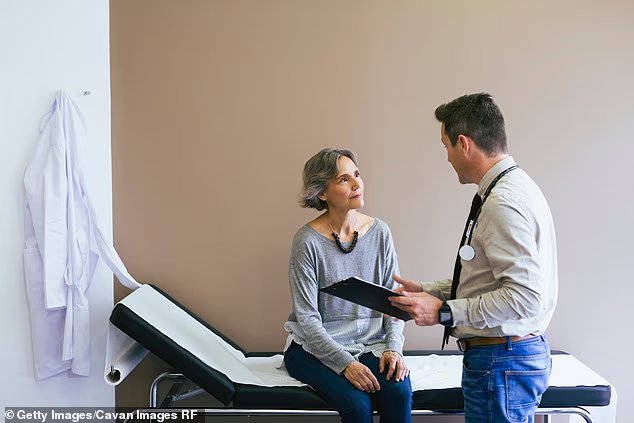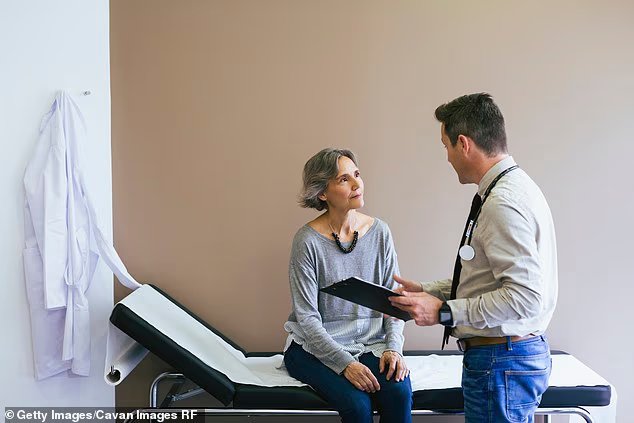DR MAX PEMBERTON: I’m an NHS consultant, this is what you MUST do to get your GP to take you seriously – especially if you’re a woman

DR MAX PEMBERTON: I’m an NHS consultant, this is what you MUST do to get your GP to take you seriously – especially if you’re a woman


Many of us have had an unsatisfactory appointment with a doctor who didn’t look up from their keyboard, interrupted us and jumped to conclusions, potentially missing key symptoms and leaving us frustrated.
Sadly, this is one of the most common complaints among patients – a YouGov survey published last week found 70 per cent of women and 52 per cent of men have felt dismissed or unheard by a GP.
The fact that more women feel dismissed is particularly striking, especially as so many GPs are women themselves.
Some people attribute this difference to ‘medical misogyny’ – where doctors downplay women’s health concerns, particularly those relating to periods, the menopause or chronic pain.
While this undoubtedly sometimes plays a role, I suspect that it’s also partly down to the fact that men often behave more assertively when they visit the doctor, so are potentially more likely to be listened to.
It may also be because men tend to wait until symptoms are more serious or severe before seeing a GP.
The survey comes as a new initiative, urging GPs to take a ‘three strikes and rethink’ approach to diagnosing patients, was announced in England.
A YouGov survey published last week found 70 per cent of women and 52 per cent of men have felt dismissed or unheard by a GP (Models pictured)
The new approach is aimed at preventing avoidable deaths and is known as ‘Jess’s Rule.’ It requires GPs to reassess their original diagnosis and order extra checks and a second opinion if a patient has had three appointments with no clear diagnosis or if their condition worsens.
Named after Jessica Brady, a 27-year-old engineer who died from cancer in 2020, despite having had repeated GP appointments in the months leading up to her death, it follows a campaign by her grieving parents.
I’ve always said that a vital part of medicine is simply listening to people. Feeling you’ve been understood is, in itself, therapeutic. Research shows that people who report feeling heard are more satisfied with their treatment than those who don’t – even if the outcome is the same.
As a medical student I was lucky enough to train under a wise, older GP. He taught me that after asking a patient what is wrong, you should let them talk without interrupting for a full three minutes. He even kept a clock on his table and would time it, arguing that most people will tell you everything you need to know in that time. He was convinced that listening was key to a good doctor-patient relationship.
Studies have subsequently shown that this is in fact a more efficient way of conducting a medical appointment than when the doctor tries to take charge.
But as a medic I can also sympathise with the fact that many GPs operate under tremendous time pressure.
So, here are my tips for how to get your concerns across the next time you see a GP, so you don’t feel brushed aside.
Knowledge never hurts
Research your symptoms and potential conditions beforehand, but present your findings thoughtfully. You might say, ‘I’ve noticed my symptoms align with (condition X) – could we explore this possibility?’ This shows engagement without overstepping boundaries. Do mention if you’ve been given informal advice by medical professionals who are friends.
Keep a record
Keep a detailed record of your symptoms, including when they started, how they’ve progressed, and what triggers or relieves them. Rate your pain on a one-to-ten scale rather than using vague descriptions. For instance, saying ‘my pain averages six out of ten but spikes to nine out of ten during flare-ups’ will carry more weight than saying ‘it really hurts’. This systematic approach makes your concerns harder to minimise.
Prepare key points
Focus on one primary concern per visit and structure your thoughts around three questions: What do you think might be happening? What worries you most about these symptoms? What outcome are you hoping for from this appointment? Write these points down if you get flustered under pressure.
Use objective measures
Monitor measurable symptoms at home. If blood pressure is a concern, record readings in a relaxed environment to counter any suggestions of ‘white coat hypertension’ – when high readings are attributed to the understandable anxiety of being taken in a medical setting.
For recurring symptoms, keep a diary noting patterns, severity, and triggers. Real data is harder to dismiss than subjective complaints.
Be direct
Don’t downplay the impact on your quality of life. If you’re struggling to cope or having dark thoughts, state this clearly and directly. Don’t try to be stoic – it’s important not to make serious conditions seem manageable when they’re not.
Create accountability
Take notes during the appointment. Ask specific questions like ‘What warning signs should prompt me to return?’ and ‘What’s your timeline for expected improvement?’ If a doctor seems unheeding, politely request clarification and document their responses. Consider bringing a trusted friend or family member for support and as a witness.
You can request to see someone else if you feel unheard by a doctor and should escalate concerns to the practice manager if you are not getting the respectful care you are entitled to.
Lily’s vape warning
Actress Lily James, 36, who attributes vapes to ruining her teeth
Actress Lily James, 36, recently said she believes vaping has ruined her teeth, blaming the sugar added to some vapes.
While this is true, many people don’t know that sugars are also added to cigarettes to make the smoke feel less harsh when you inhale it.
That said, I suspect in years to come we will see increased dental problems linked to vaping – not so much due to added sugars but because vaping also reduces saliva production.
Saliva protects the teeth from the harmful bacteria that cause caries. It also helps neutralise acid in the mouth.
The official advice is that although vaping isn’t risk-free, it’s nowhere near as bad for your health as traditional smoking.
If you don’t smoke, you shouldn’t vape – but if you smoke you should vape instead.
I was delighted by the incredible news that a team of doctors has managed to treat Huntington’s Disease for the first time. Caused by a faulty gene, Huntington’s is a type of dementia leading to progressive deterioration in movement and cognition.
The new treatment, involving neurosurgery to deliver a modified virus that then alters the DNA in the affected parts of the brain, slowed the disease by 75 per cent. This means that the decline that would be expected in one year instead takes four. The team who developed the treatment were tearful at the press conference to announce the results. It was very moving.
Dr Max prescribes…
A DOG
Babies who grow up with a pet dog are half as likely to develop childhood asthma compared to other babies.
No such benefit was found for growing up with a cat.
Dogs also lower anxiety, depression and loneliness through the release of feel-good hormones.
And they make us walk! New research shows they really are Man’s Best Friend.
Disclaimer: This news article has been republished exactly as it appeared on its original source, without any modification. We do not take any responsibility for its content, which remains solely the responsibility of the original publisher.
Author:
Published on: 2025-09-29 00:46:00
Source: www.dailymail.co.uk





